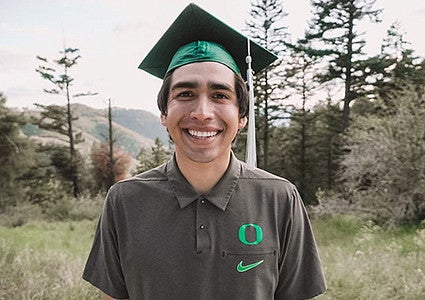
For Rene Cabrera, MS ’22 School Psychology, family is everything. He sees his accomplishments as a reflection on the hard work of his parents, who were immigrants from Mexico.
“I love what I do. I’m achieving a master’s, which is great, but to me, it’s more for my parents and all the work they’ve done to be in this country. It means a lot to me, but it means more for me to be able to tell them that thanks to you, I was able to achieve this.”
Rene started as an accounting major at St. John’s University, where he earned his bachelor’s degree, but soon realized he didn’t want to be behind a desk. That’s when he discovered school psychology. Professor Richard Wielkiewicz, PhD, inspired him to major in psychology and to apply for a master’s program in school psychology. Rene knew he wanted to be closer to family, so he explored his options in Oregon. He “always wanted to be a Duck” but wasn’t sure if that was possible for financial reasons. Scholarships helped Rene ease the burden on his family.
“Scholarships have had a significant impact. I come from a family of immigrants. My dad finished third grade and my mom finished middle school. They’re not familiar with the school system or how to apply for financial aid. They were doing their best to try to help us. It brought them to tears to know that it wasn’t going to be something they had to carry.”
Rene is currently living with family in Medford as he completes his internship in the Phoenix-Talent School District. He’s working with elementary school students there, many of whom are English language learners (ELLs). He’s noticed that ELLs are over-diagnosed with learning disabilities and autism spectrum disorder because of cultural and language differences. Rene’s own personal experience as an ELL has been valuable in empathizing with students and families facing these challenges.
“Our household always spoke Spanish. I had two vocabularies. The same number of words were divided between two languages. It’s been a challenge to help everyone understand that immigrants are still trying to acquire the language. There are kids that truly do have learning disabilities, but other kids are just developing differently. In my school district two of the schools have around 50% Latinx population. We’re educating ourselves to recognize the difference between a language acquisition issue and a disability. I’ve been focusing on closing that gap in teacher and school district knowledge, but also making sure students get the help they need.”
Since Rene is fluent in Spanish, he’s been performing Spanish-language assessments for the school district. He’s working to remedy inequality in assessment to address norms based solely on the backgrounds of white students.
“Assessments are normed for white Americans. There are differences in what is typical for an African American, Latinx, or Asian student. We must be conscious of that so we’re not mislabeling students. It’s our job to do the most thorough assessments and make sure that we’re presenting accurate information to every family.”
Faculty at the COE have been pivotal in helping Rene learn how to perform these assessments. He singled out Angie Whalen, PhD, and Geovanna Rodriguez, PhD, as being positive influences during his time as a student.
“Angie has been amazing. She has been open and receptive to helping us through a difficult time with COVID. Our program had to adjust, as many did. Geovanna has been a great mentor as well. It was her first year as a faculty member when I started. She also moved here from the Midwest, so we were able to share some of those experiences and build a relationship.”
Rene is looking forward to his career post-graduation and has accepted a position at the Phoenix-Talent School District, but he’s considering earning a PhD in the future.
“My plan is to be in the field of school psychology in public education for five years, and then maybe take a step back and reevaluate to see if this is still the place where I can be most effective. Maybe I will get my doctoral degree in school psychology or a related field, if I can make a bigger impact in my community that way.”
—By Celeste Christie, College of Education
